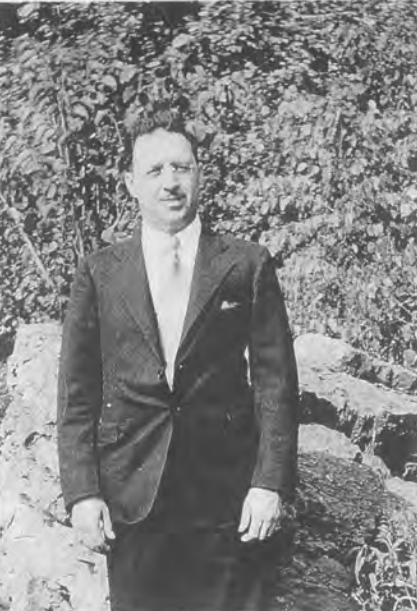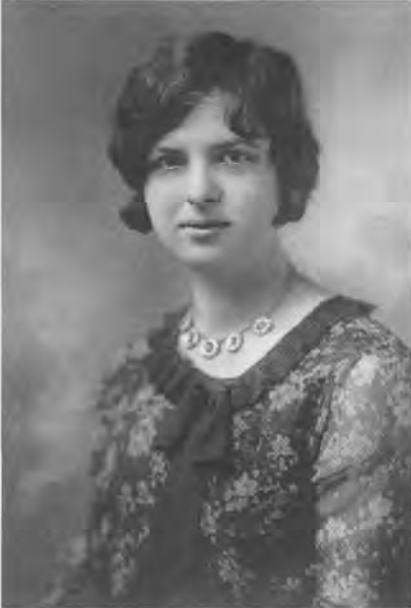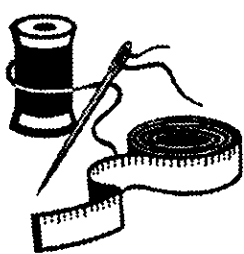Main Body
Chapter 7. The Great Depression
Everything was going well and then suddenly, things fell apart! In October of 1929, panic struck Wall Street and the Great Depression gripped the country! Factories closed their doors, businesses went bankrupt, and no work was to be had. The Mike Lavin Tailoring Shop was forced to downsize it corps of tailors for lack of business. Father, however, was retained as the coat maker, along with a pant maker, a vest maker, and the chief cutter in the shop. This did not last very long, because by year’s end, business was so poor, Mr. Lavin finally threw in the towel and closed shop. Father was devastated. He was out of work at the age of fifty-seven for the first time since he had become a tailor. There followed a frantic period of searching for work with the few custom tailoring shops in the Cleveland area that had not gone under as yet. Finally, in the summer of 1930, father was able to get sporadic work with Forchheimer’s, a custom tailoring shop in the Old Arcade. This source of work also dried up as the year 1931 dawned. The few remaining shops in town were not hiring. Father was now totally and apparently permanently out of work.
The final blow came when some of the banks failed. The fact that father saw some humor even in that dire situation is evidenced by the fact that he always got a kick out of telling the story of an incident he witnessed during the course of a run on the good old solid and stable Society for Savings Bank at the time. When reminiscing about that trying time, he loved to tell, chuckling, all the time as he told the story, of the uneducated Italian laborer who was in line at the bank teller’s window, and who said to the teller, “If you gotta, I no wanna! If you no gotta I wanna!” While not the best of English, it was an apt and eloquent way for the poor man to express his concern and what he wanted and did not want!
Up until this time, father had, as a naturalized citizen, been assimilated and had made a place for himself and his family in his adopted country. He had worked hard and was making his contribution to the United States of America as a law abiding and productive citizen of the nation. Like countless others, he was to become a victim of the Great Depression! Also, by 1929, brother Nick, had met and fallen in love with lovely Leona Henn, tall and stately in bearing, with a peaches and cream complexion and bobbed hair. Early in the year, they had eloped and were married at Belle Isle, Michigan. This came as quite a shock to my parents. Mother cried and fussed, because she had not been consulted or even advised of the wedding before hand. Father, on the other hand, was deeply hurt. This sort of thing did not happen in Italian families! Betrothals and marriages were a sacred family affair and not to be done in secret. This was considered an insult to the entire family. Having recently lost his means of livelihood, this became another blow to father’s ego as the head of the household! He reasoned that brother Nick, who was still an intern at St. John Hospital and had been accepted as a resident at St. Ann Hospital for the next year, could no longer be counted on to help with the family exchequer and his plans for helping Art and me to complete our educations. Father was proven wrong, because Nick was still able to continue as a helping partner with the family finances and later with the education of Arthur our youngest brother, which later also became a family project.
During the early 1930’s, father got odd jobs with one shop after another until the year 1933 when he began to find that wherever he went for work, he found that he was being passed over because of his age! The work available was now being assigned to the younger tailors. He now found that he was no longer employable! He and mother were now going to become completely dependent on their sons for financial support!
The main responsibility of supporting the family rested on brother Sol, who was still living at home and working full time at the Horn & Norris Lithograph Company and on brother Nick. My smaller earnings from my after school library job supplemented Sol’s full time take home pay and Nick’s contributions. Although our incomes were small, the family managed to continue to survive sans any kind of dole as the economic depression heated up. When I graduated from John Adams High School in January 1931, as much as I had wanted to go on to college, I could not, because we could not afford it. I continued working at the Harvey Rice Branch Library. I asked for a full time work schedule, and fortunately Rosalie Brooker who had succeeded Charlotte Fairchild as the Branch Librarian obliged, and, as a result, my increased earnings, added to brother Sol’s and brother Nick’s contributions, made it a little easier to keep paying the increase in rent.
Unbeknownst to us, father, although out of work, still held on to his plan to see that brother Arthur and I were to have the opportunity to further our educations and become professionals. He realized that I was greatly disappointed and saddened because I had not been able to go right on to college right after high school. From the time of my high school graduation at the end of January 1931 until the Spring of 1933, he had quietly put away a portion of each pay check that I had given to him during that time for my college education.
Father had managed to save enough money to enable me to enroll at John Carroll University at least for my first year. I was not only surprised, but also thrilled to the core when father said to me, “Here, I believe, is enough money for you to at least start your first year at the University. I am hoping and praying that the Lord will bless us with the ability to come up with the rest of the money for you to complete your four years there.” I was ecstatic, and lost no time in getting my application for admission in the mail to John Carroll University! I was accepted and began my four years of commuting to classes by street car in the Fall of 1933. As father had hoped and prayed, the Lord did bless us with the ability to continue to earn our way’. You see, father had been able, by his example, encouragement, and instruction, to pass on to us his work ethic. He often said, “You must work hard, do your best in all you undertake, and above all, you must earn your way.” He would add, “Nothing comes from slothfulness!” He would always end such periods of advice by saying, ’bove all, always be honest and honorable in all you do!” With father’s continuing encouragement, I was now working my way through college.



